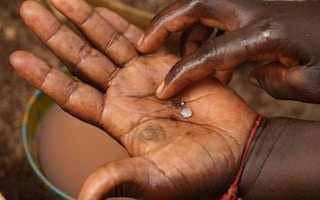China should publicly disclose what it pays African governments for extracting oil, gas and minerals as a way to level the playing field for companies worldwide and help countries get a fair deal for their natural resource wealth, billionaire investor George Soros said on Monday.
“China has to line up to join the regulations. Otherwise they are spoilers,” Soros said at a forum on natural resources held on the sidelines of the US-Africa Leaders Summit that runs through Wednesday.
Sub-Saharan Africa has immense riches in gold, gems and rare minerals and new discoveries of oil and gas off east Africa promise to make it a leading exporter of hydrocarbons by 2030. Yet its citizens see only a fraction of that wealth on a continent that has among the highest levels of poverty in the world.
“
The value of natural resources extracted each year in Africa is estimated at $500 billion but revenues collected by their governments are scarcely one-tenth of that
Daniel Kaufmann, president of the Natural Resource Governance Institute
The value of natural resources extracted each year in Africa is estimated at $500 billion but revenues collected by their governments are scarcely one-tenth of that, according to Daniel Kaufmann, president of the Natural Resource Governance Institute.
In addition, $50 billion a year leaves Africa in illicit finance through mispriced trade and corruption, said Mojanki Gumbi, a trustee of the Thabo Mbeki Foundation, which focuses on the political and economic development of Africa.
To increase accountability for natural resources, the United States and the European Union have passed laws requiring extractive industries listed on public exchanges to disclose their payments to governments.
In addition, 35 countries including many in Africa are party to the Extractive Industry Transparency Initiative (EITI), a coalition of governments, companies and civil society that works to improve accountability for management of revenues from natural resources by setting global standards for payment disclosure.
Soros called on Africans to urge China to participate in the initiative, and to expand payment disclosure from oil, gas and mining to include forestry and agriculture.
“It is a very important thing to get them to join, in fact so important that we have to be ready to reconsider the structure of EITI, or China won’t consider it,” he said.
Multi-national companies frequently complain that their competitive position in bidding for contracts is undermined if they have to adhere to US and European disclosure rules that would not apply to state-owned companies in China, which are big players in Africa.
Mo Ibrahim, a philanthropist from Sudan who made his fortune in mobile telecommunications, was cautious about whether the proposal would succeed. China does not like to engage with civil society, which is a central part of EITI, he said. However, Chinese companies are learning that failure to engage poses significant risks to their investments in Africa.
“It is the new kid on the block in Africa, and they are finding their feet. They are getting their workers kidnapped and they are learning that it is not just some nice forest you can come in and cut down, or you can go in and pick up some good iron ore,” Ibrahim said.
Moreover, Chinese companies already must disclose their payments to governments that are party to the EITI, and those that list securities in the EU and the United States will have to comply with new transparency rules that start taking effect next year.

















